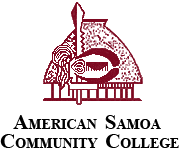Mission
- The mission of the American Samoa Community College Bachelor of Education in Elementary Education is to meet the professional development needs of pre-service and in-service teachers enabling them to effectively teach in American Samoa and within the context of the global demands of the twenty-first century.
- The American Samoa Community College Teacher Education Department provides preparatory courses for pre- and in-service teachers in the areas of Early Childhood, Elementary Education, Special Education, Educational Technology, and Teaching Samoan Language and Culture. In addition, Teacher Education Department emphasizes fundamental theories to pedagogical practices, methods and research that will improve the quality of standard-based teaching as an instrument that reflects best teaching and learning practices.
- To meet this mission, the department offers the following degree and certificate programs of studies:
- The curriculum provides for career mobility. Business majors must complete all the business courses in each program with a “C” grade or better. A “C-“grade earned in any business course is not acceptable for graduation. A business degree in Accounting or Management requires students to supplement classroom learning with practical experience at least 30 to 40 hours. This may be gained through work, internships in firms and organizations, or special projects as directed by business faculty. Students may complete these requirements by taking ACC 152A for Accounting, and MKT 212 for Management. Both courses will offer a practicum during the fourth semester. A field trip either on or off-island is required for Management majors to observe and collect data on the importance of mass production, channels of distribution, office procedures/protocol and valuing diversity in the workplace. (A national requirement).
Teacher Education offers the following courses.
Program Learning Outcomes
- Competence in Content and Pedagogy - The teacher has acceptable level of knowledge and skills of the central concepts, tools of inquiry, and structures of the discipline that he or she teaches and creates learning experiences that make aspects of the subject matter meaningful for students.
- Competence in the Samoan Language, History, and Culture - The teacher is competent and skillful in utilizing the Samoan Language, History, and Culture as a responsive teaching foundation to enhance learning.
- Competence in Technology - The teacher is skilled in technology and is knowledgeable about using technology to support instruction and enhance student learning.
- Competence in Student Diversity - The teacher understands how students differ in their approaches to learning and creates instructional opportunities that are adapted to diverse learners.
- Designs and provides meaningful learning experiences - The teacher consistently plans and implements meaningful learning experiences for students.
- Competence in Assessment - The teacher understands and uses formal and informal assessment strategies to evaluate and ensure the continuous intellectual, social, and physical development of the learner
- Competence in School & Community Relationships - The teacher fosters relationships with school colleagues, parents, and agencies in the larger community to support student learning and well-being.
- Competence in Professional Development - The teacher is a reflective practitioner who continually evaluates the effects of his or her choices and actions on others (students, parents, and other professionals in the learning community) and who actively seeks opportunities to grow professionally.

